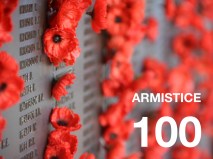When war broke out in the summer of 1914 the nation soon realised that it was not going to be the quick jolly many had anticipated and that the men wouldn’t be back for Christmas as had been initially hoped. Rather, the whole nation had to gear up for war. For a war that soon became draining and demanding. That was testing and tough. In short, what was required was sacrifice.
For many men on the front-line, in Belgium and France, in Turkey and North Africa, this war was not just dangerous. It involved the ultimate sacrifice – the giving up of their very lives. Hundreds of thousands of British soldiers and sailors died, as well as many other nationalities too.
It’s right to question the tactics of the generals, many of whom saw the men of their infantry as expendable commodities and sent them over the top without adequate appreciation of the intrinsic value of each and every soldier. But this can’t be said of every leader at the front or every political leader back home, many of whom deliberated long and hard before issuing orders, wanting to make wise plans and often covering their decision-making in prayer. They also sacrificed their comforts, their home-life and many their reputation when they were criticised by the public for well-intended decisions that sometimes didn’t pay off. Many leaders paid the ultimate sacrifice too, few more notable than Lord Kitchener, Secretary of State for War – whose face was used in recruitment posters – but who drowned in 1916 when the ship on which he was travelling was hit by a German mine, killing him and all but twelve of the 749 people aboard.
Sacrificial qualities were evident in so many during the First World War, with thousands of medals for gallantry awarded, some posthumously. Much was sacrificed by civilians who served the war effort in multiple ways back home, with some playing their part by billeting soldiers. My family lodged soldiers in 1915 who, unbeknown to everyone, carried the deadly Spanish ‘flu. Over a few weeks it killed my great grandmother and two of her children. A third child – my grandfather on my father’s side – went into a coma and died, but on entering heaven he met Christ who sent him back, telling him there was work for him to do. He went on to become a gifted evangelist and man of great prayer.
Today we should honour such noble sacrificial qualities, with wise leaders seeking to model sacrifice to others. This is the way Jesus lived. Not only did Christ say (in John 15:13) ‘Greater love has no one than this: to lay down one’s life for one’s friends’ but he also modelled this himself, by living a life of sacrifice and by giving up himself to death by horrific crucifixion. He did this in my place and yours, to pay the debt for our wrongdoings. As such he became the suffering servant, displaying all the qualities of servant leadership.
Servant leadership – getting your hands dirty, empowering others and serving not your own agenda but that of others – was modelled by so many during the First World War. However followers of Jesus know that no one exemplifies sacrifice better than Christ himself. That’s why if we want to lead sacrificially, there’s no better leader to follow than Jesus, the One who called himself the Son of Man and who (in Mark 10:43-45) said, ‘whoever wants to become great among you must be your servant, and whoever wants to be first must be slave of all. For even the Son of Man did not come to be served, but to serve and to give his life as a ransom for many.’
Many today long for greatness, but they’re unwilling to sacrifice. What sacrifices do you need to make in order to lead others to a great and victorious future?



Thanks Matt – really helpful reflection – spot on